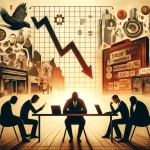The concept of a traditional workplace is fading into history, catalyzed by the pandemic’s push towards more adaptable work configurations, the burgeoning gig economy, and a renewed demand for equitable working conditions. This trifecta of change is fueling ongoing discussions and will significantly influence the employment domain for years to come.
The New Norm of Remote Work
What started as a pandemic-induced emergency measure has morphed into a preferred mode of operation for many, underscoring the value of flexibility and the importance of maintaining work-life harmony. Yet, this shift reveals a growing disparity. Certain sectors have embraced remote work with open arms, while others face challenges in integration. Questions about productivity measures, the dilution of organizational culture, and the eligibility for remote work persist, framing it as either a universal entitlement or a selective benefit.
Gig Economy: A Realm of Contrasts
The allure of freelance and contract work lies in its promise of autonomy and schedule control, but these advantages often come with the price of diminished job security and a lack of traditional employment benefits. The debate intensifies around the issue of gig workers being classified as independent contractors, a move by companies to sidestep the provision of employee benefits, casting a shadow of instability over the workforce.
The Resurgence of Labor Advocacy
Amidst the backdrop of the pandemic, the widening chasm of income inequality, and the evolving work paradigm, labor movements are experiencing a revival. Workers from various sectors, from retail to tech, are mobilizing for fair wages, improved benefits, and a voice in shaping their work environments, marking a pivotal moment in labor advocacy.
Forging the Future Workplace: Challenges and Potentials
This shift towards a more fluid workplace landscape presents both hurdles and opportunities for transformative progress:
- Addressing Inequality: The risk of deepening socioeconomic divides through remote work and gig economy practices necessitates careful oversight and equitable regulatory frameworks.
- Rethinking Physical Spaces: Organizations are reassessing their physical office requirements, influencing commercial real estate and city development strategies.
- Modernizing Work Laws: Current labor regulations fall short of addressing the unique challenges presented by gig work and remote employment scenarios, prompting a call for legislative updates.
- Empowering the Workforce: The current climate offers labor movements a chance to advocate for widespread changes that could benefit a diverse range of workers.
Envisioning Tomorrow’s Workplace
The future workplace is poised to be a composite model that incorporates remote operations, on-site collaborations, and an expanded gig workforce. The realization of this vision depends on several key factors:
- Embracing Technological Advancements: The development and adoption of sophisticated tools for collaboration and efficiency are vital for thriving hybrid work models.
- Implementing Progressive Legislation: Revising employment laws to protect rights, ensure equitable compensation, and provide security for all types of workers is critical.
- Cultivating Employer Engagement: Success requires a commitment from companies to foster trust, offer equal opportunities to remote and in-office employees, and cultivate a supportive and inclusive culture.
The trajectory towards a more flexible and inclusive workplace is laden with complexity but holds promise for a reimagined work environment that prioritizes equity, adaptability, and worker welfare.








